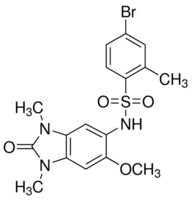All AbMole products are for research use only, cannot be used for human consumption.

For this product's availability, delivery time and price, please email [email protected] directly or click the "Inquiry Now" button below.
OF-1 is a chemical probe for the bromodomains of the BRPF (BRomodomain and PHD Finger containing) family of scaffolding proteins (BRPF1, BRPF2, BRPF3) that assemble histone acetyltransferase (HAT) complexes of the MYST family members MOZ and MORF. The BRPF1 protein is the scaffold subunit of the MYST acetyltransferase complex, which plays a crucial roles in DNA repair, recombination and replication as well as transcription activation. OF-1 binds to BRPF1B with a Kd of 100 nM , to BRPF2 with a Kd of 500 nM and to BRPF3 with a Kd of 2.4 mM, and shows >100-fold selectivity against most other bromodomains. The closest off-target effects are against BRD4 (39-fold selectivity) and 50% inhibition of TIF1a at 20 μM. For full characterization details, please see OF-1![]() on the Structural Genomics Consortium (SGC) website.
on the Structural Genomics Consortium (SGC) website.
To learn about other SGC chemical probes for epigenetic targets, visit sigma.com/sgc
| Molecular Weight | 440.31 |
| Formula | C17H18BrN3O4S |
| CAS Number | 919973-83-4 |
| Solubility (25°C) | DMSO: 5 mg/mL (warmed) |
| Storage |
Powder -20°C 3 years ; 4°C 2 years In solvent -80°C 6 months ; -20°C 1 month |
[1] Won-Gune Jeong, et al. Removal of 1,2-dichloroethane in groundwater using Fenton oxidation
[2] Bas C Stunnenberg, et al. N-of-1 Trials in Neurology: A Systematic Review
[3] Wanying He, et al. Status of N-of-1 Trials in Chronic Pain Management: A Narrative Review
[4] Suzanne McDonald, et al. N-of-1 Trials in Healthcare
[5] E Mordijck, et al. N-of-1 trials in child and adolescent psychiatry: a closer look at stimulants
| Related Products |
|---|
| Diethylenetriaminepentaacetic dianhydride
Diethylenetriaminepentaacetic dianhydride (DTPA anhydride) is a bifunctional chelator whose anhydride can react with amino groups in proteins (such as lysine residues) to form stable amide bonds. Diethylenetriaminepentaacetic dianhydride (DTPA anhydride) can also bind to radionuclides to synthesize radionuclide-labeled drug conjugates (RDCs). |
| 3-Phenylthiophene
3-Phenylthiophene is a biochemical material that can be used in scientific research. 3-Phenylthiophene is a conducting polymer precursor. |
| DSPE-PEG-FA
DSPE-PEG2K-FA is a PEG derivative containing folic acid. DSPE-PEG2K-FA has a targeting effect and can bind to folic acid receptors in cancer cells. DSPE-PEG2K-FA forms micelles/lipid bilayers and can be used in research on targeted drug delivery systems. |
| Lifastuzumab
Lifastuzumab is a humanized anti-NaPi2b IgG1 monoclonal antibody. |
| GPVI antagonist 1
GPVI antagonist 1 is a glycoprotein VI (GPVI) platelet receptor antagonist. GPVI antagonist 1 inhibits collagen-induced platelet aggregation with an IC50 of 25.3 μM. |
All AbMole products are for research use only, cannot be used for human consumption or veterinary use. We do not provide products or services to individuals. Please comply with the intended use and do not use AbMole products for any other purpose.


Products are for research use only. Not for human use. We do not sell to patients.
© Copyright 2010-2024 AbMole BioScience. All Rights Reserved.
